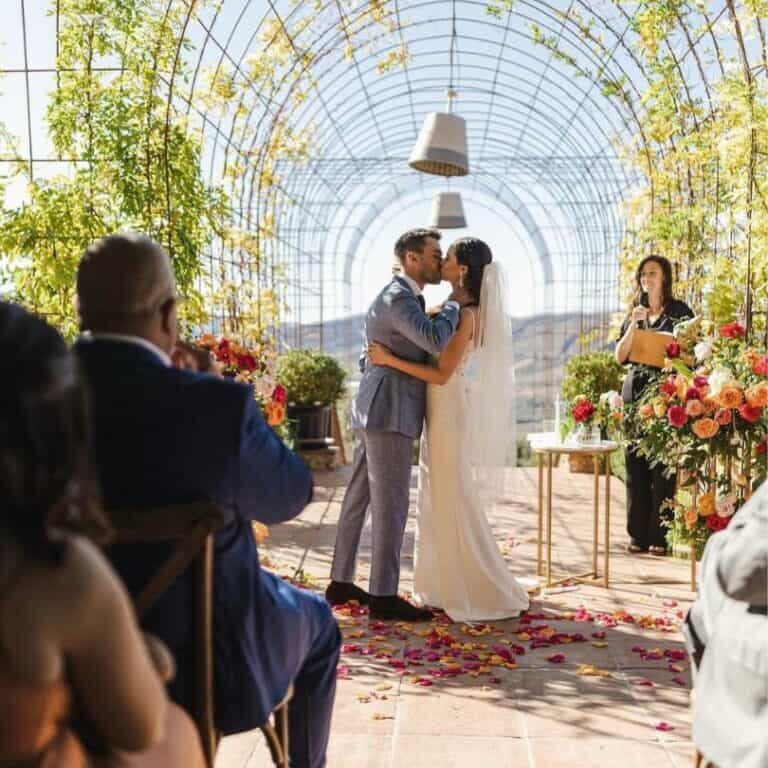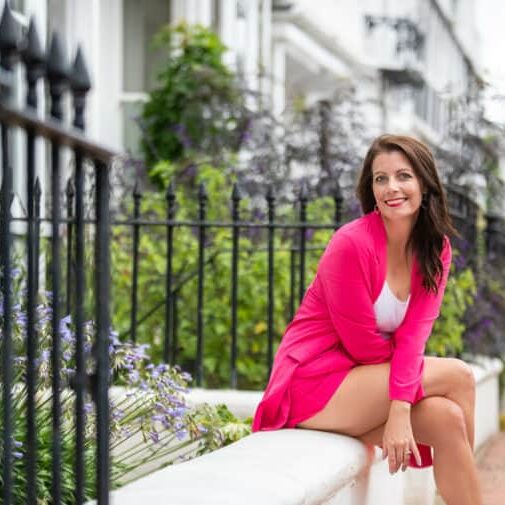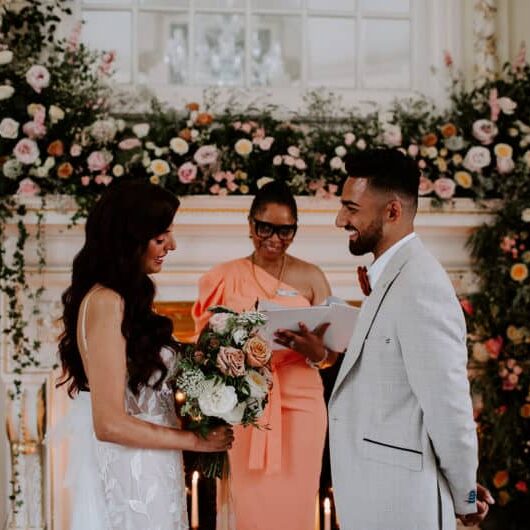Celebrant Definition & Meaning: What is a Wedding Celebrant
The Cambridge Dictionary celebrant definition simply describes a celebrant as – a person who leads a ceremony such as a marriage or a funeral. But that doesn’t really tell you what a Celebrant is, or what they do. Here at The Academy of Modern Celebrancy, we’d describe a celebrant as a bringer of joy, a weaver of stories, a marker of meaningful moments… and so much more.
We’re obviously talking about Independent Celebrants, but did you know there are 5 different types of wedding celebrants in the UK? All types perform wedding ceremonies for couples but there are significant differences in the role they play.

The different types of Wedding Celebrants in the UK
In the UK, there are five celebrant professions, and they all perform slightly different roles:
- Independent celebrants
- Humanists
- Interfaith Ministers
- Civil Registrars
- Clergy
We’ll explore each here to give you a better sense of what role they each play as a wedding celebrant:
Independent Celebrants defined
An independent wedding celebrant creates personalised ceremonies tailored to individual preferences and beliefs. Because they are independent, they’re not tied to a single faith or belief system, but they can deliver ceremonies that combine elements from different faiths, beliefs and cultures – or deliver completely religious-free ceremonies.
Wedding celebrants usually meet with couples to get to know them before their big day and help them plan and personalise their ceremony with meaningful scripts, readings, poems and other suggestions to make it unique and memorable.
Independent wedding celebrants lead the ceremony on the day, and can include union rituals like handfasting, candle lighting or sand ceremonies as part of the ceremony.
Independent Celebrants are able to perform ceremonies anywhere, but under UK and Scottish law, their ceremonies are not currently legally binding (although this is currently under review).
Humanist Ministers Defined
Humanist Celebrants are part of the Humanist Organisation; they provide an alternative to religious ceremonies for people wishing to celebrate or commemorate key life events in a tailored non-religious or spiritual service.
Humanist Celebrants are able to perform ceremonies anywhere. Like Independent Celebrants, under English and Welsh law, their ceremonies are not currently legally binding, but in Scotland and Northern Ireland, Humanist Celebrants are able to legally marry you.
Interfaith Ministers Defined
Interfaith Ministers don’t subscribe to a single religion, they offer religious and spiritually focused wedding ceremonies to those who want to celebrate their faith, but who may not be able to get married in their chosen house of prayer i.e. Catholics who have been divorced or couples who are marrying between religions.
Interfaith is not a religion. It walks among the religions. Interfaith begins when we create a bridge between one set of beliefs and traditions and another… An Interfaith Minister ideally is one who turns towards all, regardless of their beliefs or practices, with an open heart and mind, offering them a mirror to their own wholeness and their own divinity.”
OneSpirit Minister, Susanna Stefanachi Macomb
Interfaith Celebrants are able to perform ceremonies anywhere. Like Humanist Celebrants, their ceremonies are not currently legally binding in the UK, but in Scotland, Interfaith Celebrants are able to legally marry you.
Clergy
Clergy are celebrants linked to a specific religion i.e. Church of England, Catholic Church, Judaism (Jewish Faith), Islam (Muslim Faith). Clergy celebrants offer religious ceremonies that follow the strict guidelines defined by the religion and Church. Clergy must be ordained by their individual religion and Religious weddings can only take place in licensed religious house or churches.
Most clergy-led weddings are legally binding in the UK, however under current laws in England, Wales and Northern Ireland Islamic weddings are not considered legally binding and couples will need to legally formalise their marriage at a registry office or with a civil registrar.
Civil Registrars
Civil registrars are employed by local authorities and councils to provide legally binding weddings in the UK. They can marry you at a registry office or a licensed building in the UK.
Civil registrars don’t meet with the couple before the wedding and must follow a legal framework for the wedding ceremony, so personalisation is limited. Civil Registrars cannot include religious references in their ceremonies, such as poems, readings, or religious songs.
In general, when someone refers to a Celebrant in the UK, they are normally referring to an Independent Celebrant.
What does a wedding celebrant do?
Wedding celebrants do so much more than just turn up on the day and conduct the ceremony. They meet with couples to get to know them before their big day and help them plan and personalise their ceremony with meaningful ceremony scripts, readings, poems and other suggestions to make it unique and memorable.
They lead the ceremony on the day, which might include rituals like handfasting, candle lighting or sand ceremonies
Jennifer, the Founder of The Academy of Modern Celebrancy explains what an Independent celebrant does.
Related: The role of a Wedding Celebrant in the UK
Celebrant vs Registrar
Registrars are employed by the council and are not independent or self-employed. They offer ceremonies within designated rooms at the council buildings and come out to venues that have wedding licenses.
Ceremonies carried out by registrars are very brief (usually under 15 minutes), and most significantly, the wording of the ceremony is non-personalised. So every couple has the same standard script that has been performed again and again.
Independent Celebrant-led ceremonies have a multitude of advantages:
- More modern, more fun, more passion
- Bespoke to truly reflect the happy couple
- Opportunity to create an unforgettable one-off experience
- Limitless choice of location
- Couple will form a relationship with the person delivering their special event
- Potential for significant savings on venue costs
- Greater flexibility in timings and dates
Sometimes celebrants may attend ceremonies with registrars. The Registrar will complete the legal aspect and the celebrant officiate the ceremony itself. This way the ceremony can be personalised to the couple.
What’s the difference between a Wedding Celebrant and a Wedding Officiant
There is no difference between a wedding celebrant and a wedding officiant. It’s two different ways to describe the same thing. Both refer to the person who performs the wedding ceremony. There’s no legal implication in the use of either name.
Officiant vs celebrant – which should you use?
It’s up to you which name you use but you’ll find the understanding and use varies by country: the term celebrant is more commonly used in Australia, New Zealand, Canada and the UK, whereas you’ll normally find celebrants being referred to as Officiants as the official name in the USA,
Marriage Celebrant Meaning
A marriage celebrant is a term usually reserved for use when people mean an Independent Wedding Celebrant or a Humanist Celebrant. Both conduct wedding ceremonies and can offer personalised ceremonies that are unique to you. Humanist Celebrants are not able to include religious references in their ceremonies, whereas Independent Celebrants can include both religious and spiritual elements, and can also conduct non-religious wedding ceremonies too.
Can a Celebrant legally marry you?
This depends on where you are in the world. Currently in England and Wales, celebrants are unable to bind couples in a legal marriage. If you head slightly north to Scotland; Interfaith Ministers, Humanists and members of a religious group can legally marry couples. In Northern Ireland, you are also allowed to legally marry couples if you are a Humanist.
However, The Wedding Celebrant Commission in the UK are currently lobbying to extend the rights of celebrants to legally bind couples and hopefully there will be some positive change across the British Isles soon…
Meanwhile in Australia and New Zealand, qualified independent celebrants can legally perform marriages and civil unions.
And if you are in the U.S., people can become officially ‘ordained’ and can legally marry a couple.
Are Celebrant led-ceremonies religious?
Independent Celebrant-led ceremonies provide the flexibility to be entirely free of religious references or can include religious or spiritual elements (and everything in between).
Couples can pick and choose whichever themes or ideas they want to include – so under the guidance of a passionate and creative celebrant they can design a ceremony that is as personal and unique as their relationship. They could include both Pagan traditions such as handfasting and religious songs or readings – no two ceremonies will be the same!

How do I become a Celebrant?
There are many options available to become a celebrant. But we believe that professional training through distance learning is the way forward!
At the Academy of Modern Celebrancy, we offer online training courses but with a difference. We support you with online 1-2-1 coaching and group sessions, and give you access to your own hub of video and workbook tutorials. You learn at your own pace from the comfort of your own home.
When you enrol with AMC, you become part of a team of celebrants that will help you learn how to be a celebrant and how to be successful too. We won’t just teach you how to be a celebrant, we will teach you how to run a successful business too. Your success is our success – so we are with you all the way!
Related: How to become a Celebrant
Want to be a celebrant?
Let’s see if it is the right career for you: TAKE THE QUIZ NOW
Jennifer Claire
Jennifer is the Director of the leading celebrant training company, The Academy of Modern Celebrancy as well as the Founder of The Celebrant Directory, supporting over 600 celebrants globally.
Jennifer run a 2.5k community of celebrants who she dedicates her time to helping them grow their businesses and taking celebrancy from a hobby to a lifestyle.
Jennifer heads up the global Celebrant Industry Awards and the global celebrant summit, Celebrantopia each year!
A celebrant herself since 2010, she knows what it takes to make it in the industry and trains the best celebrants out there across the UK, Europe and the USA.
Take the Quiz to find out if you have what it takes!
Download the Ultimate Guide to becoming a Celebrant & find out how you can make this happen!

If you liked this article you may enjoy ...
Training to be an accredited Celebrant in Spain
Celebrancy is a growing profession in Spain fueled by demand for personalised, non-religious, and interfaith ceremonies, destination weddings and robust ex-pat communities from the UK and beyond. If you’re considering Training to be an accredited Celebrant in Spain, there are a few things you’ll need to know, so we’ve put together this handy guide to…
5 Essential Skills for Celebrants
Have you ever dreamt of officiating life’s most cherished moments – the joyous vows of a wedding ceremony, the heartwarming welcome of a newborn child, or the dignified farewell of a loved one? Celebrants play a crucial role in weaving these threads of life into meaningful experiences. But what exactly does it take to become…
Wedding Celebrant Outfits: 2024 Style Guide
As a wedding celebrant, you’re not just officiating a ceremony; you’re contributing to the overall atmosphere of the special day. While the focus is naturally on the couple, your attire plays a role in setting the tone and ensuring you look professional and polished. And in 2024, we’re throwing the rulebook out of the window!…
As featured in










